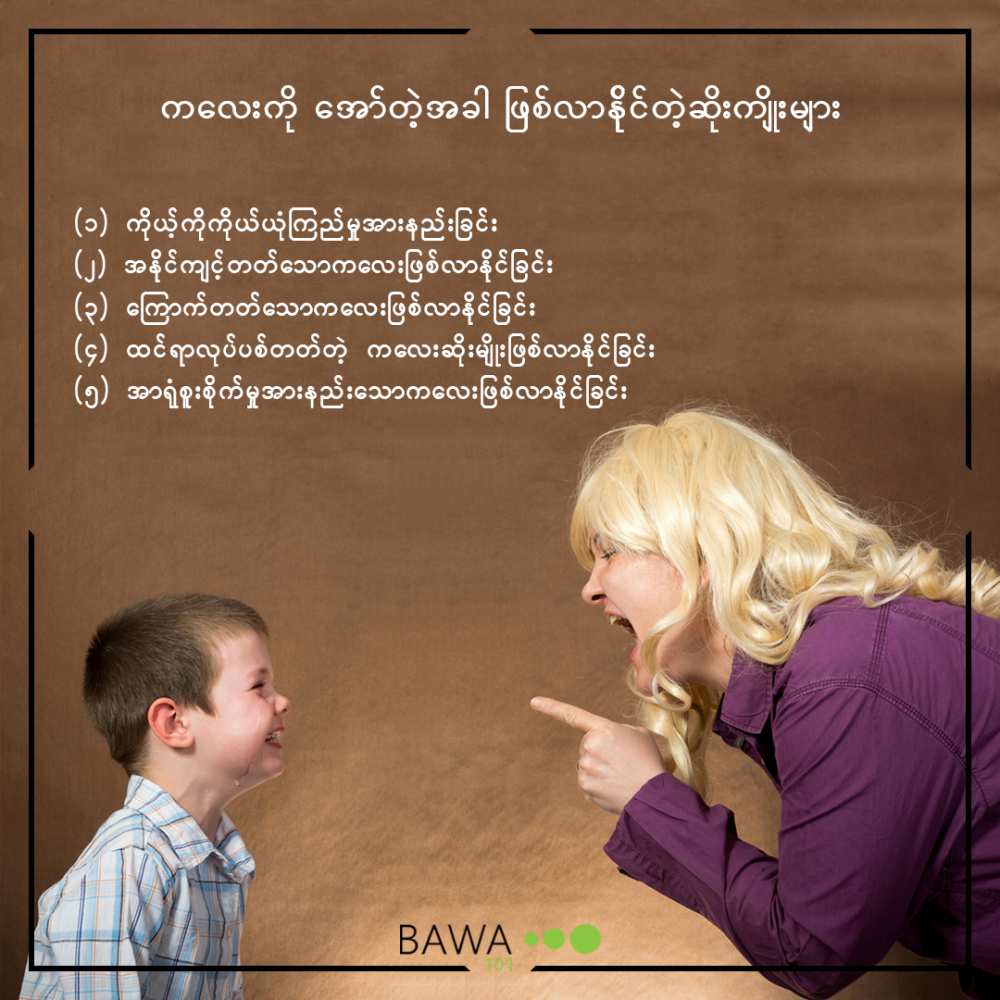The consequences of yelling at a child
1) Lack of self-confidence It can lead to a decrease in self-confidence. The child feels insignifica...
1) Lack of self-confidence
It can lead to a decrease in self-confidence. The child feels insignificant in his environment and his self-awareness becomes weak. The feeling of being yelled at instead of doing what is okay makes the child lose self-confidence.
2) Becoming a bully child
May become a bully child. 4- and 5-year-old children shouting at each other, It can become bullying. Because the child feels like adults yelling at him is bullying, and because of his grievances, he learns to yell back at others. In other words, don't forget that because the child is close to his parents, he will become the same behavior as his parents. If you yell at him without explaining the benefits, he feels like he's being bullied. He will learn to shout back and bully children younger than him.
3) Becoming a fearful child
It can become a fearful child. A child who is constantly being yelled at can become a child who is afraid to do anything and the slightest bit scared. I am no longer willing to innovate anything in front of my parents or alone. I'm always worried that my parents will yell at me. Because of this, he may become a shy and timid child among his friends.
4) Being able to become a bad child
If not, the child may still become a child who does what he or she wants to do, and does what he or she thinks is right or wrong. Some children are afraid of being yelled at in front of their parents, so they don't even do what they want to do. When a parent dies, he or she may become a child who does whatever he or she wants to do without thinking about the possible consequences. A parent may become a child who screams and yells when he finds out. Because the parents did not explain the possible consequences, but yelled and forbade them to do what they wanted to do in the presence of their parents. He is the kind of child who calms down even when his parents know he is being yelled at.
5) Becoming a child with poor concentration
You may have trouble concentrating. As a result of being emotionally abused, it is impossible to focus on anything because I feel constant fear. Because of this, a child with poor concentration becomes more difficult to control. If you don't tell the child, "If you do this...what could be the consequences?", the child will not understand why they shouldn't do it. For example. When the child tries to hold the iron, the mother says, "Hey, don't touch it." That's not something to hold. Don't you hear me telling you to go and try it..." If you shout to stop it, it will still stop. He won't understand why he doesn't hold this iron. At that time, he would try to touch and see what he wanted to explore again. After that, subsequent burns started to occur.
Only the parent said, "When this is turned on, it gets hot and I have to use it to fight clothes and clothes." Because it's hot, I'm going to burn my skin. I will get sick You will have to go to the hospital. It should be handled by adults. I don't have a baby anymore. My mother asked me not to hold her because I was afraid of hurting my son. Because I love my son, "I understand." If I explained more, the child would not try to hold on to the mother. In addition to that, the child wants something because of the parent who talks in circles. If you want to know, you will ask your parents. The parents again explained at length, You will be able to listen carefully. Alternatively, explaining to the child can strengthen the child's attention. If an adult says 20 words, a child will understand about 10 words. The remaining 10 words should be explained by choosing words that children can understand. Then the child will be more familiar with new words, will improve concentration; When you get into that habit, you don't need to yell at the child for something, but you can become the kind of child who can explain things to the child. Once the child's brain realizes that this is something that should not be handled at all, it will be remembered.
If the parents are going to yell at the child, try to control yourself. Explain the benefits in terms that are most appropriate and easy for the child to understand. Let them know that if they don't follow the rules, the consequences will be the child. If the child doesn't listen to the explanation once, "Mom has already explained why you shouldn't do it. If it happens, it will be the son himself. But if I see you doing it again, my mother will be angry."
May every parent raise their children in the best possible way. #BAWA101
It can lead to a decrease in self-confidence. The child feels insignificant in his environment and his self-awareness becomes weak. The feeling of being yelled at instead of doing what is okay makes the child lose self-confidence.
2) Becoming a bully child
May become a bully child. 4- and 5-year-old children shouting at each other, It can become bullying. Because the child feels like adults yelling at him is bullying, and because of his grievances, he learns to yell back at others. In other words, don't forget that because the child is close to his parents, he will become the same behavior as his parents. If you yell at him without explaining the benefits, he feels like he's being bullied. He will learn to shout back and bully children younger than him.
3) Becoming a fearful child
It can become a fearful child. A child who is constantly being yelled at can become a child who is afraid to do anything and the slightest bit scared. I am no longer willing to innovate anything in front of my parents or alone. I'm always worried that my parents will yell at me. Because of this, he may become a shy and timid child among his friends.
4) Being able to become a bad child
If not, the child may still become a child who does what he or she wants to do, and does what he or she thinks is right or wrong. Some children are afraid of being yelled at in front of their parents, so they don't even do what they want to do. When a parent dies, he or she may become a child who does whatever he or she wants to do without thinking about the possible consequences. A parent may become a child who screams and yells when he finds out. Because the parents did not explain the possible consequences, but yelled and forbade them to do what they wanted to do in the presence of their parents. He is the kind of child who calms down even when his parents know he is being yelled at.
5) Becoming a child with poor concentration
You may have trouble concentrating. As a result of being emotionally abused, it is impossible to focus on anything because I feel constant fear. Because of this, a child with poor concentration becomes more difficult to control. If you don't tell the child, "If you do this...what could be the consequences?", the child will not understand why they shouldn't do it. For example. When the child tries to hold the iron, the mother says, "Hey, don't touch it." That's not something to hold. Don't you hear me telling you to go and try it..." If you shout to stop it, it will still stop. He won't understand why he doesn't hold this iron. At that time, he would try to touch and see what he wanted to explore again. After that, subsequent burns started to occur.
Only the parent said, "When this is turned on, it gets hot and I have to use it to fight clothes and clothes." Because it's hot, I'm going to burn my skin. I will get sick You will have to go to the hospital. It should be handled by adults. I don't have a baby anymore. My mother asked me not to hold her because I was afraid of hurting my son. Because I love my son, "I understand." If I explained more, the child would not try to hold on to the mother. In addition to that, the child wants something because of the parent who talks in circles. If you want to know, you will ask your parents. The parents again explained at length, You will be able to listen carefully. Alternatively, explaining to the child can strengthen the child's attention. If an adult says 20 words, a child will understand about 10 words. The remaining 10 words should be explained by choosing words that children can understand. Then the child will be more familiar with new words, will improve concentration; When you get into that habit, you don't need to yell at the child for something, but you can become the kind of child who can explain things to the child. Once the child's brain realizes that this is something that should not be handled at all, it will be remembered.
If the parents are going to yell at the child, try to control yourself. Explain the benefits in terms that are most appropriate and easy for the child to understand. Let them know that if they don't follow the rules, the consequences will be the child. If the child doesn't listen to the explanation once, "Mom has already explained why you shouldn't do it. If it happens, it will be the son himself. But if I see you doing it again, my mother will be angry."
May every parent raise their children in the best possible way. #BAWA101





